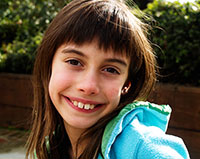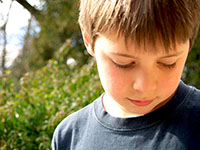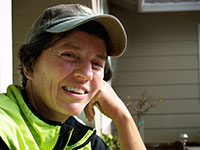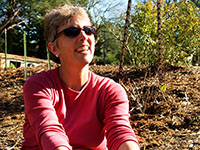
- Claire
- Clayton
- Lisa
- Vicki
- Transcript
- Audio Slideshow
- Intro

Bio: Claire is eight years old. Claire has two moms but she doesn't care, its all the same thing to her. All she cares about is playing with her best friends and skateboarding.
Claire’s Interview
Me: All right, what is it like having two moms?
Claire: Um, well, its kind of fun because usually dads yell at you. And when you have moms they practically never yell at you. And it’s fun because I get to be different from everybody else.
Me: Do the kids at school know you have two moms?
Claire: Yes.
Me: Do they treat you differently because you have to moms?
Claire: No.
Me: Do you know why they don’t treat you differently?
Claire: Well because its just... Well sometimes they treat me differently but its just the same old thing. Like if they had to moms... Well another person has two moms and no one really, everybody treats each other the same because they might get a white slip (in trouble) for not treating people good.
Me: Did they used to not treat you good?
Claire: Well in kindergarten, but now they do. Sometimes my mom had to come in and explain everything and yeah.
Me: Do you think you are any different then the kids who have a mom and a dad?
Claire: Nope.
Me: What is the best part about having two moms?
Claire: Um, well that, they don’t like work always. Because I have one mom who doesn’t work. And another mom who works. And after my mom lost her job. So it’s just like no work, I always get to be with my mom, and she is never in her office.
Me: So you get to spend more time with them?
Claire: Yes.
Me: Your moms just got married, are you glad that they got married?
Claire: Yes.
Me: You know what Prop 8 is, can you explain what it is?
Claire: Okay. Prop 8 is kind of like a thing where... Well kind of like gay rights kind of. Yes on 8 means gay rights are like not good. No on prop 8 is yes we do want gay human rights.
Me: Prop 8 recently passed, do you think it is fair?
Claire: No. I don’t think it’s fair at all.
Me: How did you react when you saw prop 8 passed?
Claire: Nothing really. I just shrugged. But my brother made a big deal about it.
Me: He said he was angry, weren’t you angry as well?
Claire: A little bit.
Me: What kinds of things do you do with your moms? What’s the day in the life of Claire?
Claire: (laughs) Well usually, skate parks, my mom taking me to the skate park. Going over to Johnny and Christian’s (friends). Um, having an annoying brother all the way around the house. And then having a grandma, who always wants to clean stuff up. And having two moms is just a regular day that a mom and dad would have, pretty much.
Me: That’s a really good answer.... Okay here’s the question I didn’t ask Clayton: does it bother you that books and TV and media always portray families with a mom and a dad, and not with a mom and a mom?
Claire: Well sometimes they have two moms and two dads or something in a commercial. But no it doesn’t bother me at all.
Me: Really?
Claire: ....(no)
Me: Do you wish you had a dad?
Claire: No. But sometimes yes. Well actually never. Nope. I always want to have two moms.
Me: Why is that?
Claire: Because you get used to it. First you think: oh I’m different than everybody but then after like a few years, people will treat you the same. And then you are like not a big deal. Same routine, same everything.
Me: So you are exactly the same as a kid who has a mom and a dad, right?
Claire: Yeah.

Bio: Clayton is eight years old. He has two moms. But that makes no difference to him. It's the same thing as having a mom and a dad. His life is just the same as a kid with a mom and a dad. School, homework, and playing with friends.
Clayton’s Interview
Me: So what is it like having two moms?
Clayton: It’s not really anything.
Me: Not really anything?
Clay: No.
Me: Is it different?
Clay: No, no. Not exactly.
Me: Can you say some more about that?
Clay: It’s not exactly different because I’m used to it. So it isn’t really different for me.
Me: Okay. Do the kids at school know that you have two moms?
Clay: Yes most of them do.
Me: Do they treat you any differently?
Clay: No.
Me: Is there a reason they don’t treat you differently?
Clay: Not really. They just don’t treat me differently. Some of them don’t know, so it doesn’t really matter. There’s no reason.
Me: Okay. So, do you think you are any different than kids who have a mom and a dad?
Clay: No. No.
Me: Is there a reason why?
Clay: No.
Me: Okay. What is the best part of having two moms?
Clay: That I have a mom with me all the time. (laughs)
Me: Are you glad your moms got married?
Clay: Yes.
Me: Why?
Clay: I don’t know. I’m just glad.
Me: What is your definition of marriage?
Clay: Um, like loving somebody who you love.
Me: You know what prop 8 is, what exactly is it?
Clay: It’s a proposition about gay marriage. Yes on prop 8 would mean against it. And no on prop 8 would be not against it.
Me: What do you think of it? Is it fair?
Clay: No. Yes on prop 8 is not fair.
Me: So, you know that prop 8 passed. So how did you feel when it passed?
Clay: Very angry.
Me: Very angry?
Clay: Yeah.
Me: Can you elaborate? Can you go on more about it?
Clay: Very angry because their...Their pretty much saying...Other people that you don’t know are saying “oh you can’t get married.” So I was really angry.
Me: What kinds of things do you do with your moms? What is your day... Like a day in the life of Clayton, what is it like?
Clay: Um, it’s just normal. I don’t really know how to describe it.
Me: So...Okay. Here’s a big one. And I want you to answer really detailed, okay? Alrighty. Do you wish you had a dad?
Clay: No because I don’t really wish one. Because it’s just...I like having two moms. And it’s very enjoyable. It’s just enjoyable for me because I always have a mom with me and all the other stuff.
Me: Does it bother you to be surrounded by girls all day?
Clay: Um, no. (laughs) Actually yes. Kind of because it’s like I'm never with boys or men. Because it’s like I'm always with women. It’s kind of annoying.

Bio: Lisa is a full time stay-at-home mom. She is super mom. Getting the kids ready for school, taking them to school, helping out in the kids classrooms, helping with homework, and taking them to after school activities. She is just like all mothers.
Lisa’s Interview
Me: How was your life growing up? And is your family excepting of your lifestyle and family?
Lisa: Um, in a word my life growing up was very different from how I’m raising my kids. It was.. There wasn’t a lot of playing together with my parents. We didn’t interact much. It was you were to be seen but not heard. There was a lot of physical disciplining. And verbal disciplining. And we weren’t a very communicative or close family. It was very, traditional ‘50s. Shut up, do you homework, go to bed, don’t bother us. And, um, what was the second part of the question?
Me: Is your family excepting of your lifestyle?
Lisa: Oh yeah. Ironically my mother and father, well my dad is gone now, they were very accepting of Vicki and they treat Claire and Clayton like their their own grandkids. Just really really excepting of us. Which has been wonderful.
Me: How does the way you were raised affect the way you raise your kids? It’s obviously different.
Lisa: Yeah. Well I knew I wasn’t going to.. Well at first I saw that when you raise children and you haven’t done any work on yourself, or you haven’t kind of looked at why things happen to you as a child, you just repeat them. It’s just like a chain that you are a link in and you just keep doing it. When we first got the kids I found out I was repeating what my parents used to do. Which was yell, try to control them, discipline them. You know think that they were supposed to do what I told them. Then I saw the path I was going down. And Vicki and I both went and got some counseling and some guidance about you know how we wanted to raise our children differently then how we were raised. To brake this pattern. So, we had to do a lot of work on how we wanted to parent. We took a lot of parenting classes. And I just decided I didn’t want ever hit my kids. I didn’t ever want them to feel like they weren’t important enough, that their voices couldn’t be heard. I didn’t want secrets. Which we had in my family. And I wanted them to be able to ask anything and get an honest answer. And not be protected from the so-called truth of whatever it is they wanted to know. So I just talk to them about everything and anything. Which didn’t happen in my family.
Me: Why did you decide to have kids? Was it a tough choice?
Lisa: (laughing) I didn’t decide Vicki did. I decided to have them because I was in love with Vicki and she wanted children. And I really had, we had to do a lot of work around that. Because it wasn’t something I wanted. I didn’t want to have anything, um, interfere with me being taken care of, and me being able to do what I needed to do for me. And I knew that having kids was going completely challenge that. So I had to let go of being selfish and wanting to have my own life and go the way I wanted it to. Because when you have kids there’s no control. I mean everything is out of control, you can’t predict what is going to happen. Or if you are going to get to go on that date you wanted to or you had a trip planned. And I mean everything is up in the air when you have children. But, um, that was my fear, so we worked through that. And, um, I basically decided to have them because Vicki wanted to. And as I said I had to do a lot of work about why I didn’t want to have them. It was great because we had to do all that talking and all that work. So we consciously decided to have them, it wasn’t like some accident or we did it because everybody else was doing it. It was a conscious choice.
Me: What is the hardest part about raising kids as a gay couple?
Lisa: I think it is just as hard whether you are gay or straight. It’s giving up your own personal time and having things, you know, free time taken away from you. And not being able to talk to your spouse when you want to or finish a sentence. I don’t think it is anything different.
Me: What is your definition of marriage?
Lisa: Um, a commitment to work things out, to communicate, to love each other, to support each other, and to believe in each other. And let the other person be who they want to be. And you get to be who you want to be.
Me: So there is no difference between a gay marriage and a straight marriage?
Lisa: I think gay marriages are better. Because I think it’s not societally, um, what’s the word...endorsed. When a gay couple decides to get married it’s like a gut-wrenching, depthful, emotional decision. It’s not something that is assumed or you know you’re supposed to get married and have children. It’s like when you get together you really have to, like with having children, it’s more of a difficult decision. Like Clayton said “Wouldn’t it be easier to be married to a man.” Its like yeah, but I wouldn’t trade my life for anything. Because sometime hard decisions are the better ones because you have made them, it didn’t just happen.
Me: You recently got married, has that changed your life?
Lisa: No.
Me: How will prop 8 effect your marriage?
Lisa: Well if the state decides that we have to get divorced, by the views of other people who don’t even know us, it will effect us financially. And some of the benefits that came upon us through the marriage that we were able to do in California, we will have to give up some of those benefits that are more financial than anything else. But when we had kids I had to adopt them. But now I think it’s easier to do that. I mean all the benefits straight couples get will be taken away from us.
Me: So the main difference between a straight marriage and a gay marriage is the financial aspect?
Lisa: Um, well that’s part of it. I think for my kids and the reason we went through the marriage again...Although there were some financial benefits that you can get through domestic partners so we didn’t have to do the marriage. I wanted my kids to see that we were no different than anybody else. And our relationship was no less important. So I think, it’s not just financial. I think it’s what you tell friends and family, that you are two people who are committed and want to stay together and are willing to make that commitment. And we wanted to make it public. So I think it’s social and financial.
Me: What is your daily life like?
Lisa: Crazy. Very busy. (laughs) Um, when they go to school, it making breakfast, making lunches, getting them to school, I volunteer at the school. Being involved in their activities, with Aikido. And the other thing that’s different from my childhood that their getting in their childhood, is the ability to see what it is they like and enjoy. And getting the opportunity to explore their gifts, like music and physical activities, like Aikido or skateboarding. Our life is pretty much centered around them. But we also try to, Vicki and I try to have our own quite time. Family meals are important. And once a week we have family meetings. Where we talk about the week and try to appreciate each other. And talk about problems. So I think our days are just filled with activity and fun. And eating a lot. And as you can see chaos. (laughs)
Me: What challenges do you have when explaining your family to your kids and their friends?
Lisa: Um, how a kid can have two moms and not have a dad. I mean physically it’s impossible, so we have to explain about the donor and how it happened physically. But other than that it doesn’t...I think the only problem the kids have had at school and that we’ve had sometimes is how did you decide how to pick a donor, who was the donor, if they were going to meet the donor, is important for them to know who their so called biological father was. But that doesn’t seem to be an issue like I said to you before we started interviewing, I think the kids get teased about other things more than having two moms. Kids can just be mean at school, but because their confident and their happy and they feel secure we don’t do a lot of explaining.
Me: So they aren’t judged based on having two moms?
Lisa: No. I think some kids probably depending on their families. Like when we drove to school during the election and there were yes on 8 signs, Clayton found that painful to go to school where people were saying basically to him your moms shouldn’t get to be married. But no I don’t think that they get judged by having two moms more than any other kids get judged for... Their judged more on their social and you know academic involvement at school than anything else.
Me: How did you feel society views you now compared to 10 years ago or 20?
Lisa: I think a little more, um, accepting. And love doesn’t have antenna that it only picks the opposite sex. That you fall in love with who you fall in love with. And I think people are starting to kind of understand, why should we tell people who they can love. And you know we don’t...like Clayton said during the proposition, “we don’t tell other people that they have to get a divorce, why should people tell you, that don’t even know who you are.” I feel like people are starting to think that’s seems so invasive and wrong. Who are we to say who somebody may fall in love with. I’m glad my kids have that choice in their life. I tell them I want you to fall in love with someone who treats you good. And you feel uplifted with and mutually respected by. But I don’t care who it is. But when I was growing up, it was like you got to fall in love with a man. What if you don’t feel like you have any other choices? The alternatives in my day were not very pretty. A lot of people were either in the closet or fake marriages that were love less or ending their lives. I feel like it’s a lot better now.

Bio: Vicki Vaughn is a mother of eight year old twins. And it's a full time job. Her and her partner, Lisa, are amazing parents. They help out at the kids school, take the kids to all their sports and extra activities. All around she's a typical soccer mom.
Vicki’s Interview
Me: How was your life growing up? is your family accepting of your lifestyle and family?
Vicki: My life growing up. I grew up in just a typical American family. Mom and dad, sister. Um, no. They are not accepting of family. I came out about when I was in my early twenties. And my mom had a really tough time with accepting that I was gay. Because she had this, I think, fantasy that I was going to marry a prince and go off like Cinderella and all that. So my dad was very accepting and he went in the gay parade, and we did stuff for Parents and Friends of Lesbians and Gays. And my sister was very accepting, but my mom always had a hard time with it. But growing up it was just typical; I was a really good student in school. And I had boyfriends in high school. Went to the Proms and all the normal stuff that all high school-ers do.
Me: How does the way you were raised affect the way you raise your kids?
Vicki: That’s interesting. Because I wouldn’t raise my kids the way I was raised. So in terms of discipline, like you know it was more spanking and not encouragement. One of the things we really try to do is lift up with words not put down. We don’t spank. We don’t do punishing things, I mean certainly there’s timeouts, and we set rules and stuff. But I don’t at all discipline like my parents did. I mean they disciplined out of fear. And we don’t discipline that way. So it’s extremely 180-degree difference.
Me: Why did you decide to have kids? Was it a tough choice?
Vicki: I always wanted to have kids. But I wasn’t sure that was going to be a possibility because I was gay. And then I got very involved in my career in high tech. And moving up the career ladder. I kind of put that off. And it wasn’t until I got into my thirties that I really started to want to have kids. That’s when I was like you know how am I going to make this happen. Um, so I knew that was something I wanted and then of course I got involved with Lisa. And I told her, you know up front, like in the beginning when we started dating, I was like I really want to have kids. And she was like I really don’t want to have kids. So that was like one of the reasons we kind of stopped dating. But yeah, I always knew I wanted to have them, but probably not until I got into my thirties. And was it a tough decision...I think the decision that is tough is that is kind of an arduous process, because it’s not like you can just say okay let’s go get pregnant. I mean you have to really talk about it. My biggest fear was, um, I didn’t want my kids to experience prejudice of having two moms. And so I didn’t want to put them through that whole thing. But... Then determining, you know, how to get a donor. So its just a lot of... the process is long. But... I think what led up to that is that we had done a lot of volunteer work with Child Advocates in Santa Clara County, so we had two boys that we took care of. We had kids in our neighborhood. So we knew we liked kids and we wanted them in our life. And it got to the point were I don’t want to take care of other people’s kids, now I want to do it...Because I was seeing how you know the Child Advocate Program helped me see how people were not dealing with taking care of their own children in the court system. So I was ready to kind of raise my own. And do it differently. The process is different because you have to really talk about it and communicate it. And really be thought-filled about how you’re going to do it.
Me: What is the hardest part about raising kids as a lesbian couple?
Vicki: Raising kids is just tough. It doesn’t matter if you are gay or straight. Raising kids is a full time job. And being gay isn’t even come into question. In fact I would say 98% of the time I don’t even think of myself as gay. I just think... with all the parents around us are straight, everybody in our school pretty much is straight. I don’t ever...It’s like unless I’m out with Lisa on some date with a bunch of other gay women, I don’t really think of myself or identify so much as, I just really now identify as mom. I don’t really identify as lesbian. I identify as Claire and Clayton’s mom. And that’s what kids call me, and that’s what I kind of call myself, hi I’m Claire and Clayton’s mom, or one of their moms. So, I don’t know if tough for a lesbian as much. I think you just get concerned about how are your children, is there prejudice at school. Are they being teased. That sort of thing. But being a parent is just tough. It doesn’t matter if you are gay.
Me: What is your definition of marriage?
Vicki: Two people that love each other and that want to commit together. And you know kind of support each other. And that grow together. So it’s both love and growth and support through forever in monogamy. Just the two of you. You know respect.
Me: So there is no difference between a gay and straight marriage?
Vicki: No, I don’t think so. Except that’s not the kind of marriage my parents had. My parents were not a happy couple. They should have never stayed together. They were probably together over almost 50 years now and their still miserable together. So I mean nothing I wanted to replicate in my life. My life is all about having a partner that I can communicate with, support each other emotionally and you know however. Certainly not the kind of model of relationship that I grew up with at all.
Me: You recently got married, how has that changed your life?
Vicki: Not in one bit. Because we had a commitment ceremony back in ’97 before we had the kids. And that wasn’t legal by any means, but I felt just as married in ’97 when it wasn’t legal in California as I did in 2008 when we had our vows and made it legal. No, if fact I have to say there was a tinge a couple days afterwards, were I thought: “oh my god this is really legal. I mean this is amazing.” And then you could tell people, “I’m legally married.” So it kind of felt a little different only because you could say that. It didn’t last long enough for it to really permeate, because prop 8. We got married in September, by November 4 prop 8 had already won. So it didn’t last that long. But for like a few days afterwards it felt a little different. But I’ve always felt married since we married in ’97. So legality didn’t mean a thing.
Me: You said legality didn’t mean a thing, so how will prop 8 effect your marriage though?
Vicki: Well, so we get state benefits as domestic partners. And we’ve had those benefits for at least over ten years. Two years ago the state of California allowed us to now, for me to be able to claim taxes head of house hold. So that Lisa and I can be married, where as domestic partners I can claim Lisa and my state income tax. And that’s a big deal because Lisa doesn’t work outside the home and I do. And so the amount of money I make, most straight couples get to write off their spouse who doesn’t work. I don’t have that luxury from a federal standpoint. In fact, last year alone our tax accountant said as a couple I had to pay $10,000 more than a straight married couple would have to pay in federal tax, income tax. Last year alone. And so the fact that we are married in the state of California helps us from state benefits. But doesn’t give me anything for federal benefits, or let’s say we were in another state and Lisa was in an accident. I could not go into the emergency room and see her because I’m not considered anybody. I’m not, you know, next of kin to her. Because I’m not a blood relative or I’m not considered her spouse. So, until the federal benefits push through, there’s really nothing that marriage is going to do for us because domestic partnership is covering that. The reason prop 8 is so important for California though, it that the more states that allow marriage, eventually the federal government will have to say oh okay so we’ve got 1/3 or 1/2 of our states that are already saying that gay marriage is acceptable, now we’re going to give federal benefits. Because for me right now federal benefits are what Lisa and I need. Both from a financial standpoint as well as just a security standpoint for health, for in the hospital. For example when we had the children. Since I was the birth mother, Lisa had to adopt them. So we had to through and pay money to an attorney so that she could physically adopt the children because they were not her blood children. But if I had been a straight couple, and a straight women, and if my kids didn’t have a father. My husband could have adopted them for no cost. But because we were a gay couple, even though I was the birth mom and I was choosing who I wanted that to be, that was not allowed. So, there’s certainly discrimination. I believe some of that has changed in the last 8 years, but there’s certainly still discrimination in California. And it’s usually monetary discrimination, it usually means gay and lesbians have to pay more money for their wills and their trusts have to be written a certain way to protect each other in the event of death. Federal income tax has to be paid differently, so that’s really the benefits gays and lesbians miss out on, is it’s a monetary benefit. And of course you want to be accepted in society. So people want to say yeah I’m married too. Just like all my straight friends and families in our school with kids are married. We want those same benefits because we’re a family.
Me: The day in the life of Vicki... What is that like?
Vicki: (laughs) Well, I’m not working right now. Because I’ve just been laid off, so I have a little bit more time in my day. But I work remotely out of my home office. So usually it means getting up before the kids, at least 45 minutes so I can have my coffee and read the paper. And then it’s you know making lunches and getting them ready for school. And getting them, trying to get them to brush their teeth and brush their hair and get them out the door by 8:30. Then usually just going to work. And during the week both of us volunteer in their classrooms, so that’s usually an hour or two hours a day of volunteering. And then you know, I have my exercise class that I go to. Let’s see, Clayton’s in boy scouts and Claire’s in softball. So I coach Claire’s softball team. And Lisa does boy scouts. And let’s see what else... Oh there’s piano on Wednesday’s. So you know it’s just being a typical soccer mom. Taking them to soccer practice, softball practice, piano lessons, after school activities, play dates with friends. And our house is always seems to be filled with kids. All the kids want to come to our house and play because we have a big pool. So in the summertime, it’s like go to Claire and Clayton’s house. So our summertime is usually filled with all sorts of families coming over for parties and play dates. So our typical day has nothing about me being gay. It really has everything to do with my kids and school and life and going to work. And you know coming home and making dinner and getting homework done at the end of the night. Again I don’t live a very gay life. I’m not really sure what that is anymore. Except for the fact that Lisa and I finally get to have a little bit of peace and quite about 9:30 at night when the kids go to bed. And we can catch up for about a half an hour before we go to bed. And that’s you know a typical day.
Me: Do you have any challenges explaining your family to your kids and their friends?
Vicki: You know kids are really... Kids don’t have any prejudice. It’s funny. When the kids turned about 4 years old, and they went to pre-school, was the first time questions came up about oh you have two moms. And they would say where’s your dad? And the kids would say we have two moms. And then the kids would go wow cool. And they’d go home and they’d tell their mom and dad that we want two moms too. And that kind of started in pre-school and kindergarten, when kids are kind of young and they all want moms. And then kids would kind of start to go well you have to have a dad. So when you get to be about second or third grade, kids realize it takes a mom and a dad to have baby. So then those questions start to come up and it gets tougher. I think for us having kids it really means talking about the birds and the bees a lot earlier. And trying to do it in a such a way that a little three or four year old can understand it. You know. The farmer has the seed and the mother has the egg. And you know you talk about it in very simplistic terms. But you know really their school is been very open to our lifestyle. We live in the North Bay, which is a very open area. There are lots of gays and lesbians that live up in this area. And probably for that reason. Lots of artists and so forth. And so the kids don’t really, I don’t think, see as much prejudice. And it’s not as... You know all kids want to get... all kids tease. And so it’s like it’s usually they tease about their teeth or what they’re wearing. I’ve never known our kids to run home and say they got teased about having two moms. In fact, Lisa and I are in the classrooms volunteering, all the kids know us. The kids love us. I think part of what has to happen in society is people have to get to know a gay couple and then go, oh whoa their no different than anybody else. And they’ve got the same challenges in their everyday life. I think... I’m not sure I answered your question...
Me: Explaining your family to people and the kids.
Vicki: So I think its tougher when… For parents. I think that’s where the prejudice lies, right? So kids are like really accepting. And then they go home and tell their mom and dad. And then the eyebrows go up, and it’s like oh really? I think our only concern was we live out in the country, and a family moved in across the field from us. And we heard that they were Evangelical Christians. My, kind of, eyebrows went up and thought “oh no.” You know this should be a challenge. Well of course you know kids as naive as they are, all four kids started playing together and who cared what kind of parents they had. I don’t even think the neighbor kids realized until about three or four months down the line that there was no dad. And they must have gone home and told their mom and dad. And at some point I kept thinking “okay, they won’t be allowing their kids over here, I’m sure.” Of course I had my own prejudices’ about Christians, Evangelicals. Come to find out they are very open-minded people and they’ve accepted us as much as I’ve accepted them. And I think it’s true, that I have my own prejudices as a gay person. I mean, sometime I think of Evangelical Christians and I’m like “oh no, angry, mean, not Christian like.” So, I had to kind of get through my stereotypes as perhaps they did. Our kids are over at each other’s houses constantly. It was a great lesson for me. I don’t know that I’ve ever experienced someone not allowing their kids to come to my house because we’re gay. But again we live in a very open area. And most people, everybody knows somebody who’s gay now a days. It’s not like a big deal as it was maybe 20 years ago. I don’t know that.... It’s pretty much...I think if you talk about it normally and just say this is what it is your kids think there’s nothing wrong with it either. I think that more people, that’s just how it’s going to change.
Me: How did you feel society views you now compared to 10-20 years ago?
Vicki: I don’t think people are as afraid as they used to be. And I also think that gays and lesbians have assimilated more into society. Because they’ve had children because now their in schools with their kids. They’ve had to assimilate with straight couples and families. Their not just a group that’s over there out in San Francisco in The Castro. But now their part of neighborhoods and you know suburbia. And I think that that’s, like 20 years ago like when I came out, was probably about 20 years ago. You know it was kind of you didn’t want anybody to know you were gay, you didn’t want to have to tell people you were gay. Because it was just too hard. I mean people have their own stereotypes. I think now a days. Well first of all, once I had kids it was like you out. Because you have kids. You don’t have to ever tell anybody your gay again, because they see you and your partner, and it’s like “oh they must be gay.” The coming out process ends right there. And when you have kids you can’t be in the closet. But I just think people are... I think the younger generation, like you and even the kids that are in their 20s now, they don’t seem to have an issue with it. I don’t know. I think it’s the people that are in their 60s and 70s that are still struggling. I mean my mother-in-law, Lisa’s mom, is 89 almost. And she is the most open individual. And loves me like her... You know, she went around her little lodge where she lives, assisted living kind of people. And she told every person that this is my daughter-in-law they just got married and people were kind of raising their eyebrows and looking at her. She’s like, you know, this is my daughter, this is her partner, and they got married yesterday. I mean, she just tells people and if they don’t like it, she tells them even more. She doesn’t care how uncomfortable you are with it. And she will push it down your throat until you’re... (laughs) Yeah this is a woman who’s a little 5 foot 2 and you know. So, I think that there are people that are a lot older that are okay with it. But I frankly do think that sexuality, and it comes down to, if you feel comfortable in your own sexuality, then you have no problem with someone else’s. The people that have the most problems with people who are gay are probably people who are struggling with something inside themselves, or their own prejudices from how they were raised. But I mean you’ve seen it with some of these politicians that have gotten caught with other men. And their like “oh no I’m no gay...” And it’s like, but they’ve been preaching against [this] non-gay... You know, “I’m not gay, I’m not gay. And it’s a bad thing.” And you find them off with some other man. There’s something going on there, you know? And I think its fear. I think if the fear goes away, then the prejudice goes away. And I think, not to equate it to black people, but I know that, because I know a lot of black people don’t like to have it equated...It’s the same kind of struggle. It’s like black people are no different. It’s the color of their skin, right? It’s no big difference. And my kids don’t see color. Just like my kids don’t see gay or not gay. So, I think that’s how it’s going to break down. It’s the next generation of youth that are going to go “ this is no big deal, just accept people for who they are.” So, we’ll see though. Time will tell.
Click here to download a transcript of the slideshow.
The transcript is a written form of my Audio Slideshow. It has all the photos and the audio clips written out.
If you don't have enough time to sit and listen to the whole slideshow, I suggest you download the transcript to breifly see what it's all about.
 Click on photo to view my slideshow.
Click on photo to view my slideshow.
(You may need to turn up the volume on your computer to hear. The interviews are a little quiet. )
Intro
My Audio Slideshow is about a lesbian couple with kids. I have known Vicki and Lisa, the moms, since I was five years old. I have never seen anything wrong with two women being in love. With my slideshow I hope to show the world that their family is no different than a family with a mom and a dad. I interviewed both Vicki and Lisa and their kids, Clayton and Claire.
Making the Audio Slideshow was a very tedious process. First we had to go out and get the audio, the interviews. Once we got the audio we had to bring it into ProTools to edit. That was also a long process. It was very frustrating for me because the computer I was working completely crashed and I lost my ProTools files. So I had to start from scratch with editing the audio. Even though it was frustrating I finally got through editing all the audio after a few hours. Once I had all the pictures and audio clips done, I started to work on the slideshow itself in Flash. Hope you enjoy the finished project!





